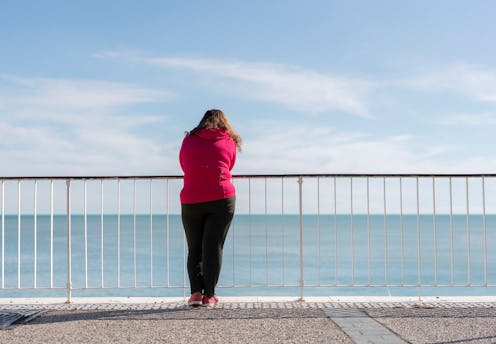Health
Why Your Anxiety Feels Worse In Summer
There is such a thing as reverse seasonal affective disorder.

You've probably heard it said before that summer is the "happiest" season. But while sunshine and warmer temperatures may be blissful for some, for others, summer can bring about its own set of challenges. In fact, did you know that summer can actually make anxiety symptoms worse?
“Anxiety can be experienced through our thoughts, feelings, and physical sensations”, Stephen Buckley, Head of Information at mental health UK charity Mind explains. “Symptoms might include feeling a sense of dread, a faster heartbeat, feeling light-headed or dizzy or having panic attacks. While experiencing some or all of these symptoms is common enough, anxiety can be classed as a mental health problem if it starts to impact your day to day life.”
Buckley continues: "If your feelings of anxiety are lasting for a long time, very regular or out of proportion to the scenario, you might have an anxiety disorder. There are a number of different kinds, including generalised anxiety disorder, social anxiety disorder, perennial anxiety or panic disorder.”
Can anxiety symptoms worsen during the summer?
Seasonal Affective Disorder (SAD) is usually experienced in the dark, gloomy months, but as Web MD explains, 10% of people who have SAD experience reverse seasonal affective disorder in the summer. Specific symptoms include loss of appetite, trouble sleeping, weight loss, and – yes – anxiety.
But why is this?
Speaking to Web MD, Ian A. Cook, MD, the director of the Depression Research Program at UCLA, says that, for some, depression in summer will be purely biological. For others, there may be external factors at play:
Heat
Warm weather can contribute to health issues such as dehydration and lack of sleep, both of which can lead to anxiety among certain people. On top of this, many of the symptoms associated with overheating mimic those experienced in an anxiety attack, such as sweating, dizziness, and faintness. The overlap between the two can definitely be confusing, and at times, scary.
Body clock
The long days of the season can also affect your body clock and throw off your circadian rhythms, which can be crucial in looking after your mental health. The sun may have us rising earlier or going to bed later, plus the heat can make it difficult to get the same hours sleep you usually would.
Hay fever
Although allergies like hay fever are considered minor health problems, the impact they can have on mental health is significant.
In a 2018 study published in Annals of Allergy, Asthma & Immunology, scientists looked into the effect hay fever (allergic rhinitis) and hay fever with eye allergies (allergic rhinoconjunctivitis) on adolescents. Lead study author Dr. Michael Blaiss said: "The emotional burden of hay fever can be huge."
He added: "Three of the studies in our review examined how adolescents are emotionally affected by hay fever [...] and hay fever with eye allergies (allergic rhinoconjunctivitis). They found adolescents with hay fever had higher rates of anxiety and depression, and a lower resistance to stress. [They] also exhibited more hostility, impulsivity, and changed their minds often."
Ways to cope with anxiety
Stephen Buckley explains that exercise is good for your mind and body and, although the weather is warm, it's still important to try and get some sort of physical movement in. If it’s a particularly hot day, try walking in the morning to beat the heat.
Maintaining a balanced diet is also key, Buckley says. “Try to eat foods that contain lots of protein and fibre, get plenty of veg, fruit and nuts, and enough water,” he explains. He suggests avoiding too much caffeine and – although tempting during summertime – avoid too many alcoholic or sugary drinks.
When it comes to sleeping, try to do everything you can ahead of going to bed to cool down your room so that the heat doesn't disturb you too much. Buckley adds that, "if you’re having trouble sleeping, try to establish a routine when you do things that you find relaxing before bed." These kind of small adjustments may make all the difference.
Additional research from Charlotte Pasha.
This article was originally published on